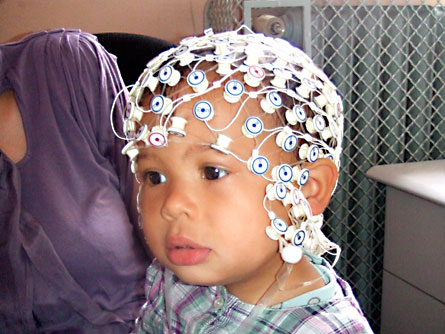2-year-olds possess grammatical insights
Brain responses suggest that toddlers already know fundamental rules for using nouns and verbs
Two-year-olds know more about grammar than they can say. Budding toddlers recognize the difference between nouns and verbs in simple sentences, even though the kids don’t utter such sentences for at least another year, say Anne Christophe of the Laboratory of Cognitive Sciences and Psycholinguistics in Paris and her colleagues.

Children begin to use two or more words at a time by age 2, but their statements are typically incomplete and show no signs of grammatical knowledge. Yet upon hearing a sentence in which a noun incorrectly replaces a verb, or a verb incorrectly replaces a noun, toddlers display split-second brain responses that signal awareness of the rule violations, Christophe’s team reports in a paper published online June 29 and set to appear in Developmental Science.
Electrical activity, mainly relegated to the left-frontal brain, spiked as toddlers heard nouns in a verb position. Electrical responses further back on the brain’s left side, in the temporal lobe, jumped as toddlers heard verbs in a noun position. Both patterns resembled those that have already been implicated in noun and verb knowledge in adults.
“This experiment suggests that brain networks responsible for language processing get organized extremely early, showing striking similarities with the adult system long before children start producing adultlike language,” Christophe says.
A basic grasp of native-language rules, or syntax, assists 2-year-olds in learning the meanings of new words and other elements of language, Christophe proposes.
In contrast, some scientists suspect that toddlers memorize a large repertoire of verbal phrases before making generalizations about object words and action words at around age 3. A related hypothesis holds that language learning partly depends on a quantitative ability to notice features of speech that regularly go together, such as pairs of syllables that consistently occur one after the other.
“Children could well have some basic syntactic knowledge by age 2, which continues to develop throughout early childhood as they identify the statistical regularities of their language,” remarks psychologist Erik Thiessen of Carnegie Mellon University in Pittsburgh.
The new findings don’t address a longstanding debate over whether language learning hinges on innate grammatical knowledge.
Christophe’s team studied 27 French toddlers within two weeks of their second birthdays. Each child wore a net of electrodes over his or her scalp that measured electrical activity across the brain’s surface. Youngsters watched a series of 30-second videos in which a woman told a story in French as she acted it out with toys.
Each story included two ungrammatical sentences. One sentence incorrectly used a two-word phrase as a verb that worked as a noun elsewhere in the story. The other sentence incorrectly used a two-word phrase as a noun that worked as a verb in another story sentence.
One of the tales, about a chicken and a strawberry, included a correct-noun sentence (translated as “She wants to eat the strawberry”) and an incorrect-noun sentence (“But she strawberries it without noticing”). In French, both sentences contained la fraise, which means the strawberry in the first sentence and strawberries it in the second sentence.
The story also contained a correct-verb sentence (“Now she looks at it with envy”) and an incorrect-verb sentence (“So she pushes the look to grasp it.”) In French, both sentences contained la regarde, which makes grammatical sense as looks at it in the first sentence but not as the look in the second sentence.







